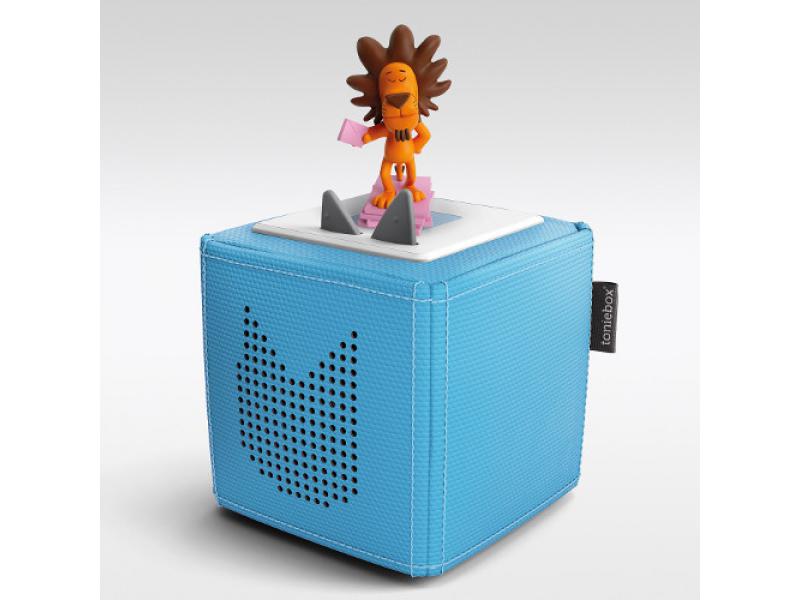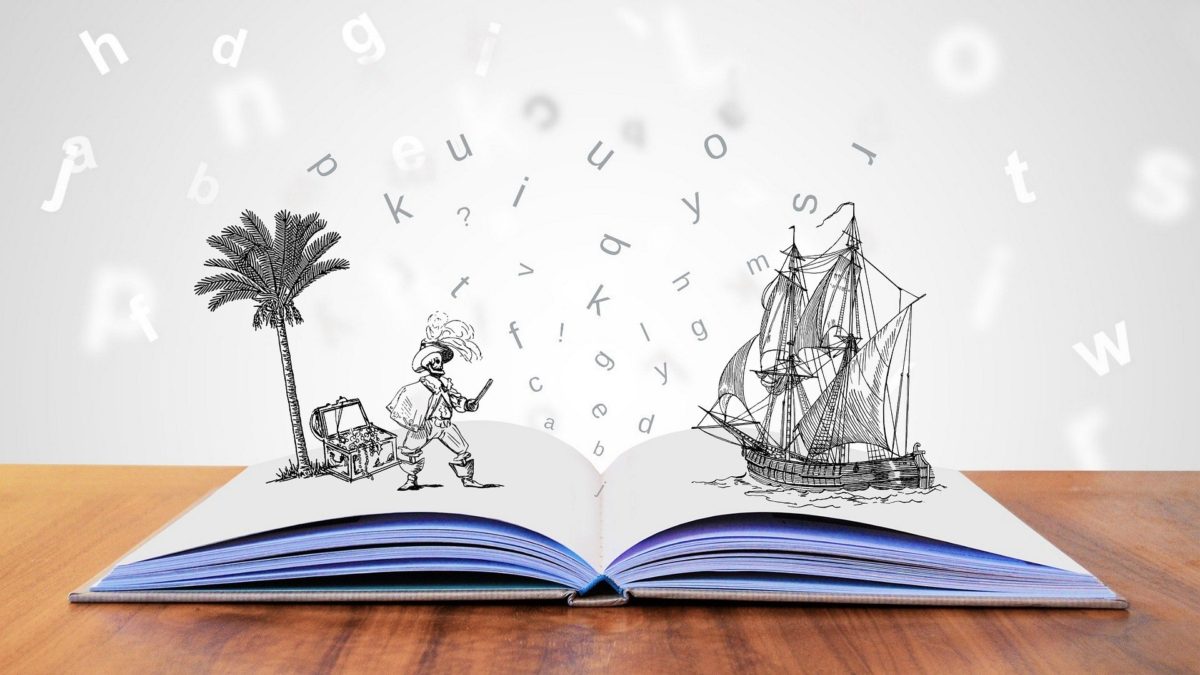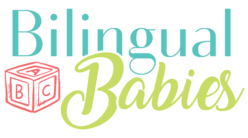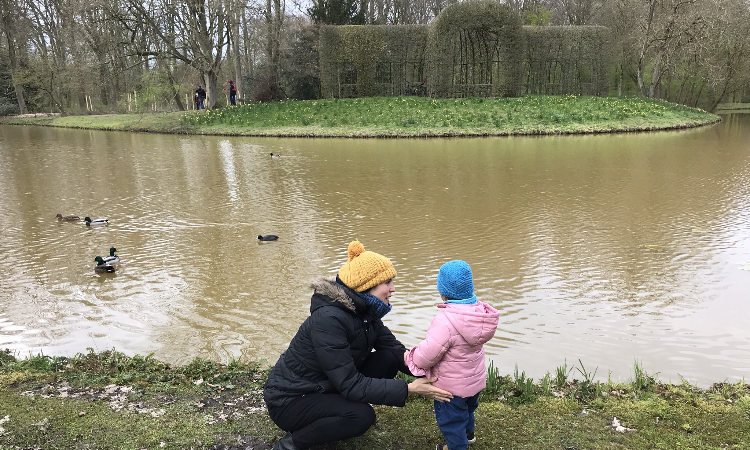Dr. Veronica Benigno is a research scientist in second language acquisition and mom of bilingual daughter. Originally from Italy, Veronica lives in Germany with her husband. Together they raise their daughter Eva Luna who grows up with German and Italian.
Interviewer: Okay, to start off: what’s your family situation? Who speaks what to whom in your family?
 Veronica: It’s my husband, our daughter Eva Luna, and myself. I speak Italian to her all the time. But when we meet my friends or other mothers with their kids and they all speak German, I would speak German to my friends and the other children, but I would still speak Italian to my daughter. I try to be very, very strict. I do not have any Italian friends in Germany. So, Eva Luna hears Italian mostly from me or when we speak with my mom or my dad during a video call. So, I would say I’m the only person with whom she really speaks Italian on a daily basis. And my husband, he speaks German all the time. However sometimes he also uses some Italian because—you know—there are some words we use a lot in Italian such as when we talk about food or things like that. So I think he uses more Italian than I use German in our daily life. So yeah, that’s the languages that we use at home.
Veronica: It’s my husband, our daughter Eva Luna, and myself. I speak Italian to her all the time. But when we meet my friends or other mothers with their kids and they all speak German, I would speak German to my friends and the other children, but I would still speak Italian to my daughter. I try to be very, very strict. I do not have any Italian friends in Germany. So, Eva Luna hears Italian mostly from me or when we speak with my mom or my dad during a video call. So, I would say I’m the only person with whom she really speaks Italian on a daily basis. And my husband, he speaks German all the time. However sometimes he also uses some Italian because—you know—there are some words we use a lot in Italian such as when we talk about food or things like that. So I think he uses more Italian than I use German in our daily life. So yeah, that’s the languages that we use at home.
Interviewer: How old is Eva Luna exactly?
Veronica: She is 20 months. Of course, it’s more challenging for me to understand her in German than in Italian. Sometimes I’m not sure if I understood well what she said. But yesterday, talking about the window, she asked my husband “Ist zu? [Is closed?] and I thought that was nice. She has started to put together two words to ask questions.
Interviewer: Okay. So, she’s at that two-word stage?
Veronica: Yes, she is starting to combine words to produce small sentences. I’m a little worried though because her German is getting quite dominant and she responds more in German. So I was wondering if you had the same fears with your daughter when she was Eva Luna’s age. I’m in Germany and German is a foreign culture for me even though I’m 100% integrated and happy with my German friends and I’m learning German too. But sometimes I have these worries. Especially now that my daughter is beginning to talk. I have noticed that she’s talking more in German than in Italian. I know that’s completely normal and the way it should be. But I get these worries like “Oh my God! Is she going to speak German to me in 6 months?” She’s also starting a playgroup next week. So I was just wondering if you had the same fears with your daughter.
Interviewer: Yes, when Ella was your daughter’s age, I was going through the same worries. In fact, our situation is very similar to yours. We live in the United States and my husband only speaks English. I am the only German speaker around Ella on a daily basis. I’m the one providing all the input, exposure, and interaction. And so, when my daughter was about the age of your daughter — about 2 and a half — she would respond in English a lot more than in German. Depending on the situation, I dealt with it in different ways. I would repeat what she said in German.I prompted her to say something in German. I would just follow up with her request if she asked me in German, and sometimes, I would pretend I didn’t understand even though she knew I understand English perfectly fine.
 So, English was becoming very dominant for her at around 2 years of age because she was in daycare and my husband doesn’t speak German. So, she even started to develop an English accent when she spoke German. But then, I took her to Germany for about three weeks. My husband couldn’t go, so it was just the two of us staying at my mother’s place. That vacation completely transformed her language use. It was a huge immersion experience for her to the extent that at the end of the 3 weeks, she had a hard time speaking to my husband. She was struggling to find words in English. So when we returned to the United States, it took a couple of days and her languages were balanced out. Ever since, the English accent is gone, and I have not had to prompt her to speak German. She naturally responds to me in German.
So, English was becoming very dominant for her at around 2 years of age because she was in daycare and my husband doesn’t speak German. So, she even started to develop an English accent when she spoke German. But then, I took her to Germany for about three weeks. My husband couldn’t go, so it was just the two of us staying at my mother’s place. That vacation completely transformed her language use. It was a huge immersion experience for her to the extent that at the end of the 3 weeks, she had a hard time speaking to my husband. She was struggling to find words in English. So when we returned to the United States, it took a couple of days and her languages were balanced out. Ever since, the English accent is gone, and I have not had to prompt her to speak German. She naturally responds to me in German.
Veronica: So now that you said she’s 3 years old, is she always speaking German to you?
Interviewer: Yes. She immediately switches when she sees me such as when I pick her up from daycare. I think it’s a matter of identity for little bilinguals too. That immersion experience in Germany, coupled with people complementing her on her German, really helped boost her little ego and helped her create her little German identity.
Veronica: Actually, I thought to do exactly that. I told myself, “Do not worry’, because we’re planning to travel to Italy in March or April. So, we are going to be there for a couple of weeks at least and she’s going to get lots of exposure, so it will improve her Italian.”
Songs, books, and interaction in Italian

Interviewer: In addition to taking her to Italy, what else do you do to expose her to Italian?
Veronica: I’m talking to her in Italian only. We sing a lot. There are a lot of children’s songs that she has heard since she was born. Eventually, my husband even had a playlist of Italian songs on his phone because he really likes those Italian songs. And every day, maybe for about 15 or 20 minutes, she’s also watching a cartoon in Italian. At the beginning, I was a bit unsure if that was right to have her watch videos this young. But then I told myself that this particular cartoon would be okay. It’s really sweet. It’s Masha and Bear, a Russian cartoon. It’s very simple. The language is simple and she absolutely loves it. So we watch it about 15 or 20 minutes a day, while I’m cooking or while I need a break.
Interviewer: I understand that. It provides supplementary exposure.
Veronica: Yes, and of course, I’m also reading books to her. Even the German books, I’m always reading them in Italian. When I take her to bed, I also tell stories without books. I just come up with random stories.
Using Kreativetonies creatively
Interviewer: I do that too. I sometimes record them on a Kreativtonie. Do you know Tonies and Tonie boxes?
Veronica: Not sure.
 Interviewer: Tonie boxes and Tonies are two parts of an audio system for children. They’re made in Dusseldorf. The Tonie box looks like a dice-shaped box radio. Tonies are little figurines that hold audiobooks or songs.
Interviewer: Tonie boxes and Tonies are two parts of an audio system for children. They’re made in Dusseldorf. The Tonie box looks like a dice-shaped box radio. Tonies are little figurines that hold audiobooks or songs.
Veronica: Oh yeah, a friend of mine has one. So you put the thing on the top of it…
Interviewer: Yes, you put the Tonie on the box and it starts playing. What they also have is so called Kreativtonies (“creative Tonies”). They are empty and you can record stuff on them. Let’s say you have a book in Italian that you read a lot, you can audio-record that through your phone and then upload it into the Tonie. Once you put the Tonie onto the Tonie box then, she will hear you read the Italian book.
Veronica: So she would hear my voice?
Interviewer: Yes, she would hear your voice.
Veronica: Oh that’s amazing. So if one day, I’m tired or I can’t tell a story, I can use a Tonie instead.
Interviewer: I use the Tonies a lot when I travel. For example, when I go to conferences, I’m gone 3 or 4 days at a time. I pre-record a lot of new books for her. Additionally, I usually take a bunch of small books in German (Pixibooks) and every morning, I record one and load it onto the creative Tonie (together with a good morning greeting for Ella). So when she gets up, she can put her creative Tonie on the Tonie box at home and she hears what I said, like a message.
 Veronica: I’m going to travel in three weeks for the first time since she was born. I’m going to Boston for a team meeting and I’m a bit worried about that. It is only 5 nights and I told myself I have to do it. How did it go with your daughter the first time you were away for a few days?
Veronica: I’m going to travel in three weeks for the first time since she was born. I’m going to Boston for a team meeting and I’m a bit worried about that. It is only 5 nights and I told myself I have to do it. How did it go with your daughter the first time you were away for a few days?
Interviewer: The first time I traveled without her was when she was about 7 months old. The first time was better for her than it was for me, I guess. She didn’t seem to notice much. My husband was with her and she went to daycare as her regular routine. Now that she’s older, it’s getting a little more difficult. But we FaceTime every night when I have to travel.
Veronica: That’s something we’ll do too.
Using your larger family as a support network
Interviewer: Have you encountered any challenges keeping up Italian as a minority language yet?
 Veronica: Not really, not really because I think Italian has a strong presence at our home. We sing a lot in Italian—even my husband. We travel to Italy more than we travel to my husband’s family. And they come to visit very often. So the Italian family is here quite often.
Veronica: Not really, not really because I think Italian has a strong presence at our home. We sing a lot in Italian—even my husband. We travel to Italy more than we travel to my husband’s family. And they come to visit very often. So the Italian family is here quite often.
Interviewer: That’s helpful.
Veronica: [laughs] You know how Italian families are. We do a lot of video calls with my parents and my sister. She has three small children. My daughter loves to talk to her cousins. So even if Italian is a minority language, so far I’ve not had any major challenge. But now that she’s beginning to speak, every day, she’s saying a new word in German, but it seems she’s not necessarily saying new words in Italian at the same speed. For the past three days, she has been saying “Nicht” when she doesn’t want something. It’s like instead of “Nein”, she started to say “Nicht”. I wasn’t sure if that is correct, but my husband said that it’s correct because she means “Ich möchte das nicht.”
Interviewer: Yes, she’s condensing the meaning to that one key word.
Modeling a child’s language can come with some quirks
Veronica: When she uses “nicht” with me, I’m usually repeating it as a question in Italian, saying “No, no?”. I try to use repetition as a way of modeling the Italian for her and trying to expose her to Italian.
 Interviewer: Yeah, that’s what I do with Ella when she responds to me in English. I either rephrase what she said or weave the correct German version into my answer. One aspect I sometimes struggle with is to naturally provide her with all different grammatical forms. For example, in German, you have different forms for each person such as ich laufe, du läufst, er läuft etc. So I sometimes feel like I need to get a bit creative when naturally correcting things like *“ich läufe.” So that’s tricky when you’re the only speaker of the language…
Interviewer: Yeah, that’s what I do with Ella when she responds to me in English. I either rephrase what she said or weave the correct German version into my answer. One aspect I sometimes struggle with is to naturally provide her with all different grammatical forms. For example, in German, you have different forms for each person such as ich laufe, du läufst, er läuft etc. So I sometimes feel like I need to get a bit creative when naturally correcting things like *“ich läufe.” So that’s tricky when you’re the only speaker of the language…
Veronica: …yes, that is true. I mean the first (I eat—ich esse), second (you eat—du isst), and third (he eats—er isst) person singular are okay… The first person plural (we eat—wir essen) I think is also quite frequent because sometimes I would say like, “Do we play together?”. But the second plural (you eat—ihr esst) is tricky… I rarely ever say it.
Interviewer: So exposure to the different forms varies and some forms are occurring less frequent which is tricky for language acquisition.
Paying attention to vocabulary in books
 Veronica: I have a background in vocabulary learning, so I’ve done a lot of work in terms of creating vocabulary exercises, assessments, and learning materials for young learners. And one of the points that we consistently make is that what is currently available is often just based on randomly selected vocabulary. So they don’t take developmental progressions into account. I find it a bit frustrating. I’ve been looking a lot for good children’s literature that is well done in terms of vocabulary which is presented but it’s difficult to find really good children’s literature under that perspective. Maybe I have a view which is too linguistic…
Veronica: I have a background in vocabulary learning, so I’ve done a lot of work in terms of creating vocabulary exercises, assessments, and learning materials for young learners. And one of the points that we consistently make is that what is currently available is often just based on randomly selected vocabulary. So they don’t take developmental progressions into account. I find it a bit frustrating. I’ve been looking a lot for good children’s literature that is well done in terms of vocabulary which is presented but it’s difficult to find really good children’s literature under that perspective. Maybe I have a view which is too linguistic…
Interviewer: No, I think you have a point. It takes a bit to find well written children’s books. I noticed that too. For example, I had bought Ella a pixie book advent calendar last year. So every day in December you open a door and get a new pixie book. But they do vary in language quality quite a bit. In fact, I stumbled a few times the other night when I read Scrooge to her because some of the words are of such low frequency that even I wouldn’t be using them actively. And so yeah, I don’t think there’s always kind of like an awareness for that particular level and… so it’s good to browse through books before buying them and present the little ones with a good mix. At the end, they absorb the language at this young age.
Veronica: Yeah, but I think they should differentiate a bit more in terms of how vocabulary and content are presented.
Interviewer: Well, on the flip-side, children also cope with gaps in their vocabulary and thus listening comprehension. They pay more attention to the overall story and meaning. But in the long run, vocabulary will become one of the major challenges that I will encounter with German. It will be a challenge to keep her academic vocabulary up throughout the school years. Ella is going to a German language school on Saturdays. So far it’s just a preschool or Kindergarten group so they do a lot of arts and crafts—just all in German. But whether that Saturday school will be enough and whether she maintains an interest in going to German school on a Saturday morning … that is another question.
Making friends with other moms who speak the minority language
 Veronica: I do think that maintaining interest is what would count the most. It’s crucial that she perceives that it is important to speak Italian and that she is interested in the Italian language. We do travel to Italy very often and we talk a lot to my family… but I’ve told myself I should find more Italian friends and maybe once a week, make sure that there is some sort of a playgroup or regular get-together; like mothers with their children…I’ve just been so busy.
Veronica: I do think that maintaining interest is what would count the most. It’s crucial that she perceives that it is important to speak Italian and that she is interested in the Italian language. We do travel to Italy very often and we talk a lot to my family… but I’ve told myself I should find more Italian friends and maybe once a week, make sure that there is some sort of a playgroup or regular get-together; like mothers with their children…I’ve just been so busy.
Interviewer: I do understand that.
Veronica: But it is important that she sees other children that may also speak Italian. Though then I thought actually these children would probably speak German as well because they’re going to school in Germany. And so the mothers would end up like speaking to each other and the kids would speak German. So I’m not sure that’s going to work.
Interviewer: Yeah, that’s a potential issue here too. It very much depends on the mom or dad for that matter. Some parents are not very strict with the minority language and that usually backfires because the children can’t speak or are not very comfortable speaking the minority language.
Veronica: Do you have other German friends with children nearby?
Interviewer: I’m gradually starting to develop more friendships with other moms who are German-speaking—especially through the German school. The Kindergarten class is 3 hours long, from like 9 to 12 on Saturday mornings. While I’m waiting, I’m chatting and hanging out with other moms and that has extended into individual playdates with them and their children. But I tend to be very rigid. I speak German to Ella and so, even if it’s mom who usually doesn’t speak German to her child, I found them to switch to German. Some of them are actually really good. They just speak German to their kids. But some, life just gets in the way for them and they don’t.
Your native language is strongly tied to your emotions
 Veronica: Oh, I think that’s a shame. For me, it’s really important to speak Italian to my daughter; not only because I want her to learn Italian, but I want her to be able to speak to my family. Also I think if I spoke German to her, I would not be 100 percent myself. There are so many things I could not say the way I would like to say them. The affective dimension is so important.
Veronica: Oh, I think that’s a shame. For me, it’s really important to speak Italian to my daughter; not only because I want her to learn Italian, but I want her to be able to speak to my family. Also I think if I spoke German to her, I would not be 100 percent myself. There are so many things I could not say the way I would like to say them. The affective dimension is so important.
Interviewer: Yeah, that’s true. Yeah, there’s something about the “mother tongue”. I had another moms I interviewed notice they feel that they are a different person when speaking different languages. One mom, in particular, was raising her children with English even though she and her husband are both native speakers of German. She just happened to live in the UK for about 10 years. But even though she had near native English and English was very important to her, she couldn’t speak English to either of her two children for the first nine months of their lives. She just could not bring herself to speaking English because she was not able to relate emotionally to the same extent that she could in German.
Veronica: Of course. I could not imagine talking German to my daughter. I love German. It’s a wonderful language and I’m really making the effort to learn it, especially now that she’s there. But I would not have the same level of emotional connection.
Interviewer: True. Okay, my last question: Do you have any advice that you would give to other bilingual parents or parents who are considering to start a bilingual journey?
 Veronica: Mmm, I think a couple of things I pointed out during this interview like (a) talking in your mother tongue all the time and (b) finding activities that (a) are really interesting for the kids and (b) include the minority language. I’d say also making sure that new vocabulary is introduced and recycled at the right pace makes a difference. The affective and playful dimension are very also important for effective learning. For example this cartoon that my daughter is watching. She loves the character in the cartoon so that brings the playful and affective dimension into the learning. I think if you combine these two things, you really give your child an extra chance to learn the language.
Veronica: Mmm, I think a couple of things I pointed out during this interview like (a) talking in your mother tongue all the time and (b) finding activities that (a) are really interesting for the kids and (b) include the minority language. I’d say also making sure that new vocabulary is introduced and recycled at the right pace makes a difference. The affective and playful dimension are very also important for effective learning. For example this cartoon that my daughter is watching. She loves the character in the cartoon so that brings the playful and affective dimension into the learning. I think if you combine these two things, you really give your child an extra chance to learn the language.
Interviewer: Yeah, that’s a good point. Don’t make it just about the language, but about the content and the culture behind it. Language is something that opens the door to these
things. Well, thank you so much for taking the time. That was really interesting.
Veronica: So it’s already over? I was enjoying it.
Interviewer: Thank you!

